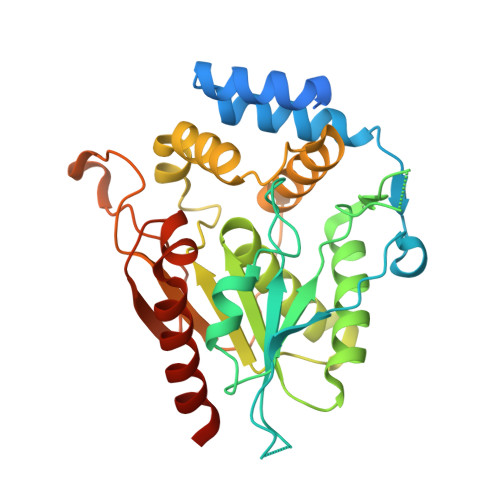Structural and Mechanistic Insights of Polyketide Macrolactonization from Polyketide-based Affinity Labels
Giraldes, J.W., Akey, D.L., Kittendorf, J.D., Sherman, D.H., Smith, J.S., Fecik, R.A.(2006) Nat Chem Biol 2: 531-536
- PubMed: 16969373
- DOI: https://doi.org/10.1038/nchembio822
- Primary Citation of Related Structures:
2H7X, 2H7Y - PubMed Abstract:
Polyketides are a diverse class of natural products having important clinical properties, including antibiotic, immunosuppressive and anticancer activities. They are biosynthesized by polyketide synthases (PKSs), which are modular, multienzyme complexes that sequentially condense simple carboxylic acid derivatives. The final reaction in many PKSs involves thioesterase-catalyzed cyclization of linear chain elongation intermediates. As the substrate in PKSs is presented by a tethered acyl carrier protein, introduction of substrate by diffusion is problematic, and no substrate-bound type I PKS domain structure has been reported so far. We describe the chemical synthesis of polyketide-based affinity labels that covalently modify the active site serine of excised pikromycin thioesterase from Streptomyces venezuelae. Crystal structures reported here of the affinity label-pikromycin thioesterase adducts provide important mechanistic insights. These results suggest that affinity labels can be valuable tools for understanding the mechanisms of individual steps within multifunctional PKSs and for directing rational engineering of PKS domains for combinatorial biosynthesis.
Organizational Affiliation:
Department of Medicinal Chemistry, University of Minnesota, 308 Harvard Street S.E., 8-101 Weaver-Densford Hall, Minneapolis, Minnesota 55455-0353, USA.


















